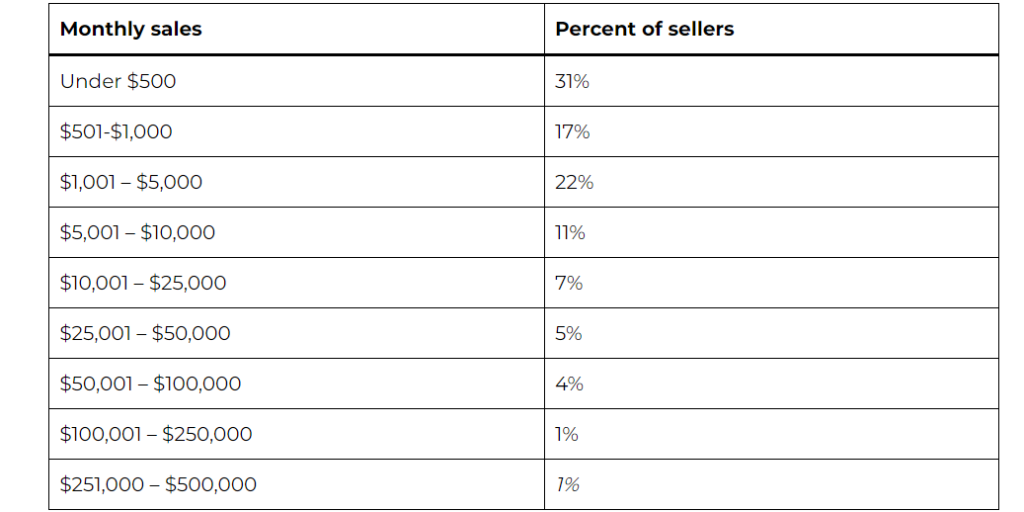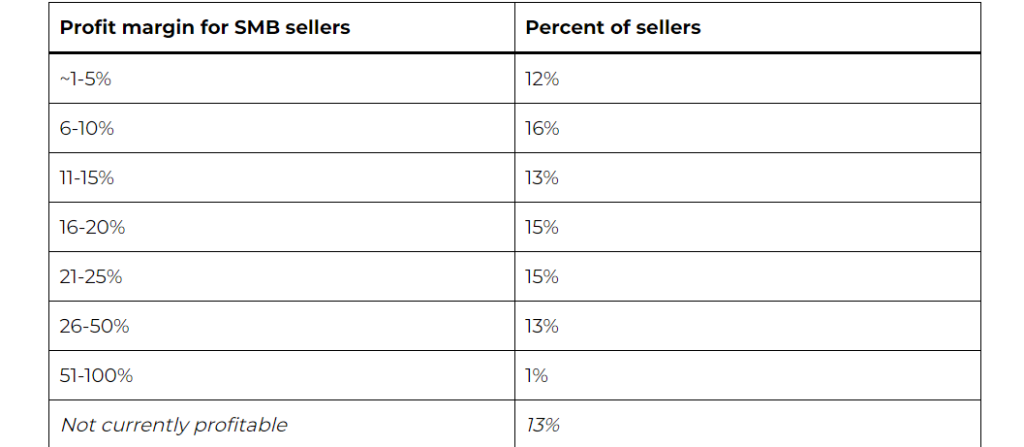Table of Contents
Is it still worth selling on Amazon?
In short: Yes. Here’s why.
Amazon’s revenue in 2023 soared to $574 billion, up from $514 billion in 2022. Nearly a quarter (23%) of this revenue comes from third-party sellers. Among those sellers, a significant 82% use Fulfillment by Amazon (FBA) to handle their orders.
Despite increasing competition on Amazon and other e-commerce platforms, the demand for online shopping continues to rise. 51% of consumers now start their product searches on Amazon.
In this article, we’ll explore why selling on Amazon FBA remains a profitable venture in 2024 and beyond.
How Much Do Amazon Sellers Make?
It’s a common question among newcomers. While our comprehensive guide delves into the full spectrum of earnings, let’s examine some current statistics on what sellers typically earn in sales revenue and net profit through Amazon FBA.
Here are some monthly revenue insights:
– 30% of sellers report monthly sales exceeding $5,000.
– 31% of sellers make under $500 per month in sales.
– 40% of Amazon sellers generate sales ranging from $1,000 to $25,000 per month.

Numerous sellers have recently launched their products on Amazon and are witnessing promising initial successes, leveraging Amazon’s robust supply chain and vast customer base.
Is selling on Amazon a profitable endeavor?
Revenue alone doesn’t paint the complete picture of a business’s success. Even with $1 million in sales, profitability hinges on managing costs effectively.
Compared to traditional brick-and-mortar businesses, Amazon sellers often enjoy more favorable profit margins. Here are some key statistics:
– 28% of sellers achieve at least a 20% profit margin.
– 30% of sellers have accumulated lifetime profits surpassing $50,000.
– 57% of Amazon sellers boast profit margins exceeding 10%.
These figures are encouraging, especially considering that many new sellers initially pursue Amazon as a side hustle.

While the majority of businesses show promising numbers, it’s crucial to acknowledge that 13% are still striving for profitability. To gain a comprehensive understanding of your financial standing, utilizing tools like Sales Analytics is invaluable. By tracking sales and profits, you can paint a clearer picture of your business’s financial health and make informed decisions to drive success.
Is it too competitive to sell on Amazon?
While competition on Amazon has intensified in recent years, the platform remains lucrative for new sellers, particularly in the U.S. marketplace, which is comparatively less competitive. Healthy competition signifies a thriving market for products, and Amazon’s expanding market share continues to offer ample growth opportunities.
With nearly 600,000 new sellers expected to join this year, it’s evident that Amazon’s customer base is continually expanding. While increased competition may present challenges, it also means accessing a larger and evolving customer pool.
For new sellers, thorough product research is imperative before entering any market. Rushing into popular products without proper analysis can lead to setbacks. Take the time to conduct comprehensive research to ensure success in e-commerce and on Amazon.
Is Amazon FBA worth the investment?
The answer lies in recognizing the competitiveness of the platform. Contrary to misconceptions, launching an Amazon FBA business demands both time and financial resources, and it’s far from a passive endeavor. Success hinges on learning, resilience, and diligent effort.
Ultimately, the decision to sell on Amazon rests on individual aspirations and goals. However, we firmly believe that the benefits outweigh the challenges. While not every seller will achieve immediate success, those committed to continual improvement and learning will find fulfillment in the Amazon marketplace.
The potential for success on Amazon is open to all. With dedication and perseverance, why shouldn’t you be the next success story?
How can one acquire the skills to sell on Amazon effectively?
Numerous successful Amazon sellers have independently mastered the trade, leveraging abundant free educational resources available online. Platforms like Zonbase offer a treasure trove of valuable content including blog articles, reports, and instructional videos.
As your business gains momentum and you allocate resources for further education, consider investing in advanced courses, hiring a mentor, or participating in industry events to elevate your skills and stay ahead of the curve.

